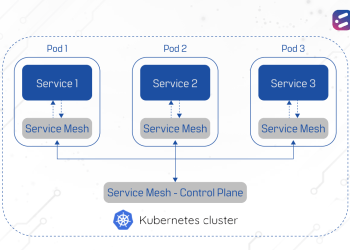Container Orchestration is the process of automating the management and scheduling of individual application containers or micro-services across clusters of data, without the need for manual intervention. In other words, it automates all aspects of coordinating and managing containers.
Let’s say for instance that a web app has three microservices within it that have been containerized – front end, back end, and database server. These three have to work together so that end users can use the web app.
The end-user uses the front end, which relies on the back end, which in turn makes use of the database server. To stick with the musical orchestra theme, Container Orchestration is the process that runs behind all these layers as the conductor of the orchestra, who coordinates it all.
This orchestra master can choose to scale up to using all the microservices or deploy just one or a few based on usage. And similarly, in the event a microservice fails, the orchestration platform rapidly deploys another microservice to replace the one that has failed, without giving the end user a chance to notice that something went wrong.
Why is Container Orchestration important?
Container orchestration becomes crucial when you are operating on a large scale. If you have just five containers and three applications, it may not be difficult to manage the deployment and scheduling of containers. But what happens when the number of end-users grows and you scale up to 1,000 containers and 400 microservices? That’s where automation of this process becomes crucial.
In just a few short years, containers have dramatically changed the way software organizations build and maintain applications. In fact, the orchestration market size is estimated to hit over $1.7 billion in six years with a CAGR of 21.2%.
What are the benefits of container orchestration?
- Easy scheduling and deployment of containers: Orchestration allows developers to quickly create new containerized applications to address growing traffic
- Scaling of containers: One can scale applications without affecting the entire application as well as equally balance application workloads
- Improved security of containers: Orchestration ensures there is no risk to internal or external security as each application’s process is separated into different containers
Container Orchestration offers increased efficiency, resilience to failure, and ease of scaling and flexibility, which lead to a seamless customer experience.
At CloudNow, we harness modern technologies and practices to deliver maximum value to our customers through smart technology solutions. Contact us to know more today.













